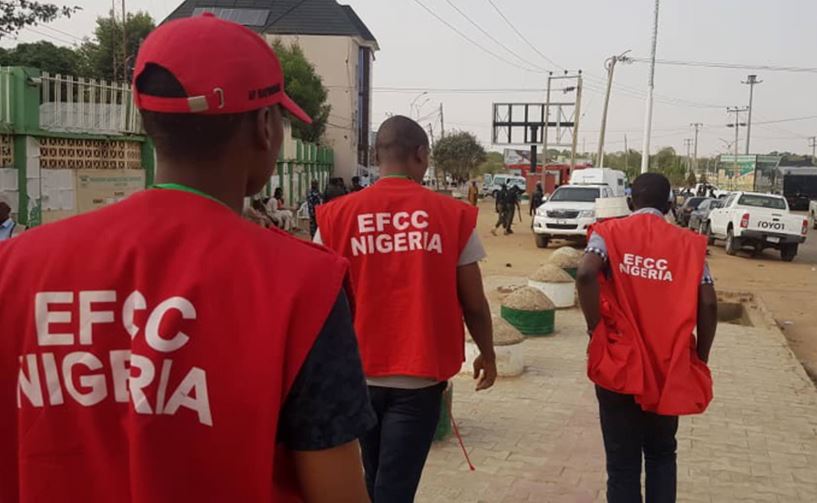N3.4Billion Fraud: EFCC Witness Reveals Massive Crypto-To-Naira Transfers For Syndicate Linked To Romance Scams, Cybercrime
Posted by Samuel on Wed 02nd Jul, 2025 - tori.ngAl-Hassan Garba, a Bureau De Change (BDC) operator, testified before the Federal High Court in Lagos on Tuesday, revealing that he converted cryptocurrency (USDT) into naira and deposited the equivalent funds into the bank account of Genting International Ltd.
Garba appeared as a prosecution witness in the ongoing trial of former government official Friday Audu and three others accused of involvement in a N3.4 billion cyber and romance scam.
Led in evidence by counsel for the Economic and Financial Crimes Commission (EFCC) Rotimi Oyedepo (SAN), alongside Bilkisu Buhari-Bala and Hanatu Kofanaisa, Garba detailed his role in the financial transactions linked to the alleged fraud.
He told Justice Daniel Osiagor that he has operated as a licensed BDC dealer under the name “Hugo” for more than 10 years.
Garba said he knew the first and second defendants—identified as Mr. Ken and Friday Audu—and had also conducted business with the fourth defendant, Genting International Ltd.
According to him, Ken contacted him in 2023 to convert USDT to naira and subsequently provided him with the bank details of Genting International Ltd to receive the naira equivalent.
"USDT is a digital currency; it's not physical. When they have USDT, I provide a wallet address for them to transfer it to, and I then credit the equivalent naira value into the account provided, always that of Genting International Ltd," Garba testified.
Garba further explained that a cryptocurrency wallet is essentially a string of numbers linked to a digital account used for crypto transactions.
He testified that starting from September 2024, the transactions became frequent, often involving daily sums between N5 million and N10 million.
When asked about his interaction with the EFCC, Garba confirmed that he was contacted during the course of the agency’s investigation.
He added that Friday Audu later got in touch with him to ask whether the EFCC had reached out.
“He asked me what day they contacted me, and I told him Monday. He said he would extend his own response, but I told him I didn’t need any extension,” Garba recounted.
The witness, Al-Hassan Garba, identified multiple high-value payments he made to Genting International Ltd, including N13 million on August 26, 2024, and N15.9 million on August 27, 2024.
He also acknowledged that some transactions were executed by his associates, including an individual named Ifesinachi, who had access to the relevant cryptocurrency wallets.
Garba confirmed a N116 million transaction carried out on September 1, 2024, and another made on September 3, 2024, by his brother, Sani—all allegedly linked to the conversion of cryptocurrency on behalf of the defendants.
When presented with his previous statements to the EFCC dated January 6, 19, 20, and 29; February 11; March 14; and April 4, Garba confirmed that he authored them. The court admitted the statements into evidence as Exhibits B1 to B8 without objection.
The Economic and Financial Crimes Commission (EFCC) had earlier arraigned former government official Friday Audu, Huang Haoyu, An Hongxu, and Genting International Ltd on a 12-count charge bordering on cybercrime, money laundering, and illegal foreign exchange transactions. All four defendants pleaded not guilty.
According to the EFCC, the defendants were allegedly part of a cyber syndicate linked to one Dualiang Pan (now at large), which operated a network of over 792 members. The group reportedly defrauded victims through online romance scams and other forms of cyber fraud.
The commission alleged that Nigerian youths were used to impersonate foreign nationals, helping the syndicate retain over $2.5 million in cryptocurrency wallets controlled by Chukwuemeka Okeke, Alhassan Garba, and Ifesinachi Jacobs—believed to be proceeds of fraud.
The EFCC further accused the defendants of retaining N3.4 billion in Genting International Ltd’s Union Bank account and transferring N106 million and N913 million to Dualiang Pan’s accounts at UBA.
They were also alleged to have conducted over N2 billion worth of illegal foreign exchange transactions without routing them through the Central Bank of Nigeria, in violation of the Foreign Exchange (Monitoring and Miscellaneous Provisions) Act.
The alleged offences contravene Section 29(2) of the Foreign Exchange Act, 2004; Sections 18 and 27 of the Cybercrime (Prohibition, Prevention, etc.) Act, 2015; and Sections 18(2)(d) and 21(c) of the Money Laundering (Prevention and Prohibition) Act, 2021.
Justice Daniel Osiagor adjourned further proceedings until July 4, 2024.

















































